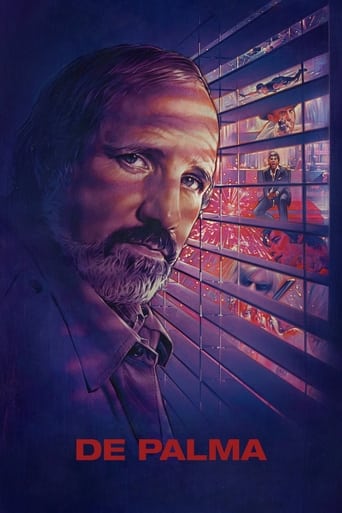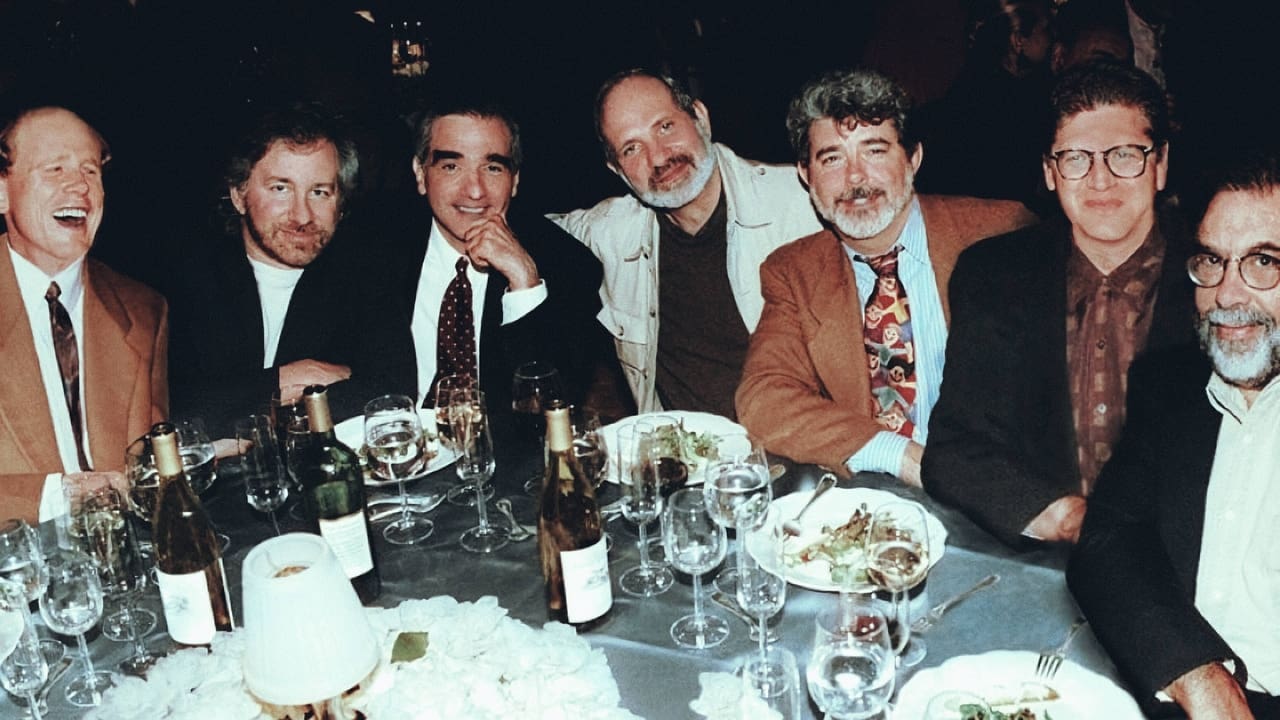ollie1939-97-957994
In this film, Noah Baumbach and Jake Paltrow interview one of Hollywood's most polarizing directors in Brian De Palma. De Palma has been praised for his innovative camera techniques and his suspenseful stories but has been criticised for misogyny in his films as well as seemingly ripping of many "Hitchcockian" traits. I am familiar with De Palma's work, although I haven't seen too many of his films apart from his most well known ones (Scarface, Untouchables, Carlito's Way etc.) but this documentary certainly wants me to explore more of his movies. The film is mainly just one shot of De Palma talking to the camera intercut with scenes from many of his movies. He goes into extreme detail about every single one of his movies, whilst occasionally talking about aspects of his personal life.De Palma is a very interesting character. He's eccentric and funny but also can be arrogant sometimes. However, as a director he is a great storyteller and talks about most of his movies in extremely intricate and interesting detail e.g. how he performed certain shots to how he dealt with many of the different egos on his set. If you're someone who isn't particularly interested in film, you'll probably not find too much enjoyment in this documentary. It really is a documentary for cinephiles (such as myself) or at least people who have some interest in the art of film making. I do sometimes wish the documentary would perhaps tap into more aspects of De Palma's personal life such as his childhood or his relationship with his peers (Scorsese, Spielberg etc.). There are moments when De Palma talks about his childhood and refers to incidents that impacted his voyeuristic style but I wish the movie tapped into more moments like these. One other criticism I also have is perhaps De Palma does tend to talk about certain movies more than other ones. I would've liked for him to go into more detail about some of his more notable failures like Mission to Mars and Passion but De Palma generally just skips over these particular films. However, if you're a movie fan or Brian De Palma fan( hell, even a detractor) you'll find great enjoyment out of this fascinating documentary about one of Hollywood's most prolific directors.
The_Badger_Man
If you've ever seen any of his films (Scarface, Mission: Impossible, among seemingly countless others) or have noticed his rather strange spiral into exclusively erotic thrillers as of late, then you just might enjoy this doc. If you happen to be a fellow director or other Hollywood fellow, then you just might appreciate exploring the mind of a uniquely-minded director.The filmmakers used a rather straight-forward technique to capture Brian De Palma's life as a director/producer/writer. They put him in front of a camera, and then let him tell them story after story about making each of his films. This format may have grown stale after a few minutes and a few stories in the hands and mouth of anyone else. Not for De Palma though. His strength as a storyteller and the editor's strength of knowing when and how to cut from one story to another kept this documentary moving at an enjoyable pace.Since I had only seen four of his almost thirty feature-length films, I was in awe of how extensive and varied his career behind the camera had been. Most of his work just never appealed to me - too weird, vulgar, and/or ill-regarded for my rather delicate palate. Here, he made his work into bite-sized snippets for easy and delicious consumption.One thing that worried me and almost dissuaded me from seeing it was my worry about spoilers. After watching the documentary, I can say that he does spoil a few plot points of his movies. Does it matter? I don't think so. He's the kind of director that specializes in building suspense and not the kind that dazzles with mind-blowing twists. For Brian De Palma, it's the journey that counts, not the destination (as much).
PimpinAinttEasy
Think about it. A film like Carlito's Way was made only 23 years ago. I cannot imagine a film like it getting made today. It cost $30 million in 1993. It would cost approximately $50 million to make today (I used % increase in CPI). I don't think any studio today would finance a $50 million gangster flick with little or no action. Unless it was made by Tarantino or someone.And even if it were to get made today, who would play Pacino and Sean Penn's roles? Tom hardy? Ryan gosling? Di Caprio? The actors today are simply terrible.I guess I went a little off topic. This documentary had De Palma talking us through some of his early socially conscious Greetings era films to his erotic films and also the big studio films. De Palma is like a really candid and jovial character who nonetheless exudes a certain toughness. It was interesting to note that he spoke at length about the movie composers that he worked with. De Palma worked with the very best of movie composers - Bernard Herrmann, Pino Donaggio, Ennio Morricone etc.He also gave an important advice to young filmmakers - most filmmakers do not make the films they want to. Certain films come their way and they make the best of it. He gave a few examples of how he would be working on one screenplay or a novel but then he would be offered something else to make and he would abandon the project he was working on. I thought that was very interesting.
MisterWhiplash
This documentary is by and large an excellent film school in 108 minutes, which is just slightly ironic as at one point in a moment of candor (among several if not often points for this man), he says how film schools produce many people who just won't ever really get into the film business (he gives a percentage of people who just won't make it, and it's high). Sometimes things do simply come out to good luck, good timing, and maybe for certain studio heads and people frankly go to see the blasted things (Carrie, as we can see here, was from all four of those things coming together at once).The whole thing is De Palma only, talking to the camera, with a tiny bit at the end of him walking down the street for... some reason I'm not sure of, maybe .98% of him doing something other than talking and gesticulating was necessary - and this is juxtaposed with some photos and newspaper clippings and footage from ALL the De Palma movies (including little side pieces like "Wonton's Wake", a student film, and he even gives an anecdote about being the one with the idea to bring Courtney Cox on stage for his charming music video for "Dancin' in the Dark"). It's a full retrospective of the violent, the satiric, the operatic, and the messy.I'm glad Paltrow and Baumbach took this approach; if it had been the requisite usual documentary where other talking heads chimed in about who this guy was and his films perhaps other opinions could pipe in, but if the movie is called DE PALMA, give us a full course of the man! And this does as far as it being a full life story, with the semi-framing of Vertigo, Hitchcock's masterwork of surrealism and voyeuristic nightmares realizes, being the lynchpin for many of his works (Obsession, Dressed to Kill, Body Double, basically any movie that has a long take of a character following another or doubles being used, not to mention Bernard Herrmann). There's also, something I'm glad about, not too much in the way of trying to deep-focus-psychoanalyze the man as far as his films; the questions, though we don't hear them, seem to lead to straightforward answers (whether you like what he has to say about women - in his plain language, he says, "I like following women, I think they make good subjects on film" in so many words, that depends on how you see it in his films).Because it's all on him for those interviews, camera planted down as De Palma talks, the scenes from his many films, from The Wedding Party to Passion (50 years!), it doesn't feel bogged down at any time - from one movie it leads to another and another, and I liked that I came away understanding there was no real grand plan for De Palma as a filmmaker (he didn't know he wanted to even be one until college, again with good timing the Nouvelle Vague changed everything as well as American experimental cinema), and this is a documentary that is charting a real commercial artist of the 2nd half of the 20th century.By this I mean he is conscious of the money - one of the anecdotes about Carrie reveals how he knew down to 200 grand what a movie *would* cost with a certainty - and yet even with this consciousness he could go too far; look at what happened between 1987 and 1993, where he goes from one of his biggest successes (Untouchables) to a personal triumph but financial flop (Casualties of War), a general fiasco (Bonfire, though he says he still enjoys the movie, "Don't read the book", he says half jokingly), and then another personal film but this time as one of *his* thrillers (Raising Cain) and finally what he thought of as "I can't make something better than this (Carlito's Way, one of my personal favorites) - it all shows a man working in the system (perhaps sometimes against his better judgment, though it's not to say he didn't want his films to be seen and appreciated, he clearly did and still does), but he was always finding his way through the films, falling on his face at times, but still coming away with how he wants to do it, if only by the skin of his teeth.If there is a complaint to have it's not even that it's too short, per-say, but near the end the section of De Palma's life and career in this century feels short-changed; perhaps this may be intentional by way of the director's point near the end where he brings it back to Hitchcock, that, according to him, post-Psycho his films didn't connect because a filmmaker's best work is in their 30's-40's-50's (spoken like a true Tarantino eh?), however I still wanted to know more about this latter-day films, that have interesting elements even as they go back to his roots (Femme Fatale, Redacted, Passion being good films, the middle one showing some innovation even in his latter years). This said, for at least 100 minutes this is film-geek ecstasy, with stories that sometimes feel like their from the front-lines, and you can't help but laugh at some/several of them. His candor brings you in, but it's also that he can simply be fully engaging with an audience as a speaker (albeit it's clear occasionally he's talking to two filmmakers behind the camera), and so for regular audiences who may have only seen Scarface or Carrie or the first M:I movie and want to more more it can be compelling as well.To put it another way, if I showed this to my film school students, I'd almost feel like I wouldn't need to hold too many other classes - except, maybe, probably, to just make a damn movie as a collective ala Home Movies!



 AD
AD









